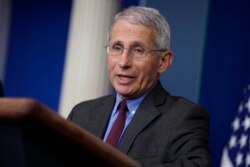The spread of infectious diseases now tops the list of major threats facing the United States, sparked in large part to the growing toll the coronavirus pandemic is inflicting on the country and the world.
According to a new survey by the Pew Research Center, 79% of Americans say infectious diseases are a major threat, compared to 73% for terrorism and the spread of nuclear weapons, and 72% for cyberattacks.
The survey of 1,000 Americans conducted by phone throughout most of the month of March, also found that Americans were more likely to name the spread of infectious diseases as a major threat after the U.S. declared a national emergency on March 13 (84%) than before (73%).
The poll has a margin of error of +/- 3.7 percentage points.
As of Monday, the U.S. has reported more than 557,000 cases of COVID-19 and more than 22,000 deaths, making it an epicenter of the pandemic.
On Sunday, the nation’s top infectious disease expert suggested earlier government action might have been able to help stem the spread of the virus across the country.
“Obviously, you could logically say that if you had a process that was ongoing and you started mitigation earlier, you could have saved lives,” Dr. Anthony Fauci told CNN. “No one is going to deny that. But what goes into those kinds of decisions is complicated.”
Fauci also said that while some parts of the country could end their stay-at-home orders and begin a return to normalcy as early as next month, there is an “extraordinary risk” if the country eases restrictions too soon.
“We know that there will be people who will be getting infected. I mean, that is just reality,” he said.
U.S. President Donald Trump declared a national emergency last month, when the country had an estimated 1,700 or so coronavirus cases, after coming under pressure from opposition Democrats to take action.
“We will defeat this threat,” he said at the time.
The declaration freed up tens of billions of dollars in funding, but the number of cases has continued to grow, along with concerns about the state of the economy.
The Pew survey found 60% of Americans saw the state of the global economy as a major threat after the disaster declaration, compared with 48% before.
And while concerns are generally high among all Americans, Pew found concerns were highest among Americans with less education and lower incomes.
On Monday, Trump tweeted that his administration is “working closely with the Governors” about when to start easing restrictions on business and travel.
“A decision by me, in conjunction with the Governors and input from others, will be made shortly!” he added.
And while Trump has been critical of other countries and global organizations during the pandemic, such as China and the World Health Organization, the Pew survey found Americans overwhelmingly support seeking international cooperation.
According the survey, 86% of Americans said it is very important to cooperate with other countries to combat the spread of infectious diseases. Ninety-seven percent said cooperation is at least somewhat important.






